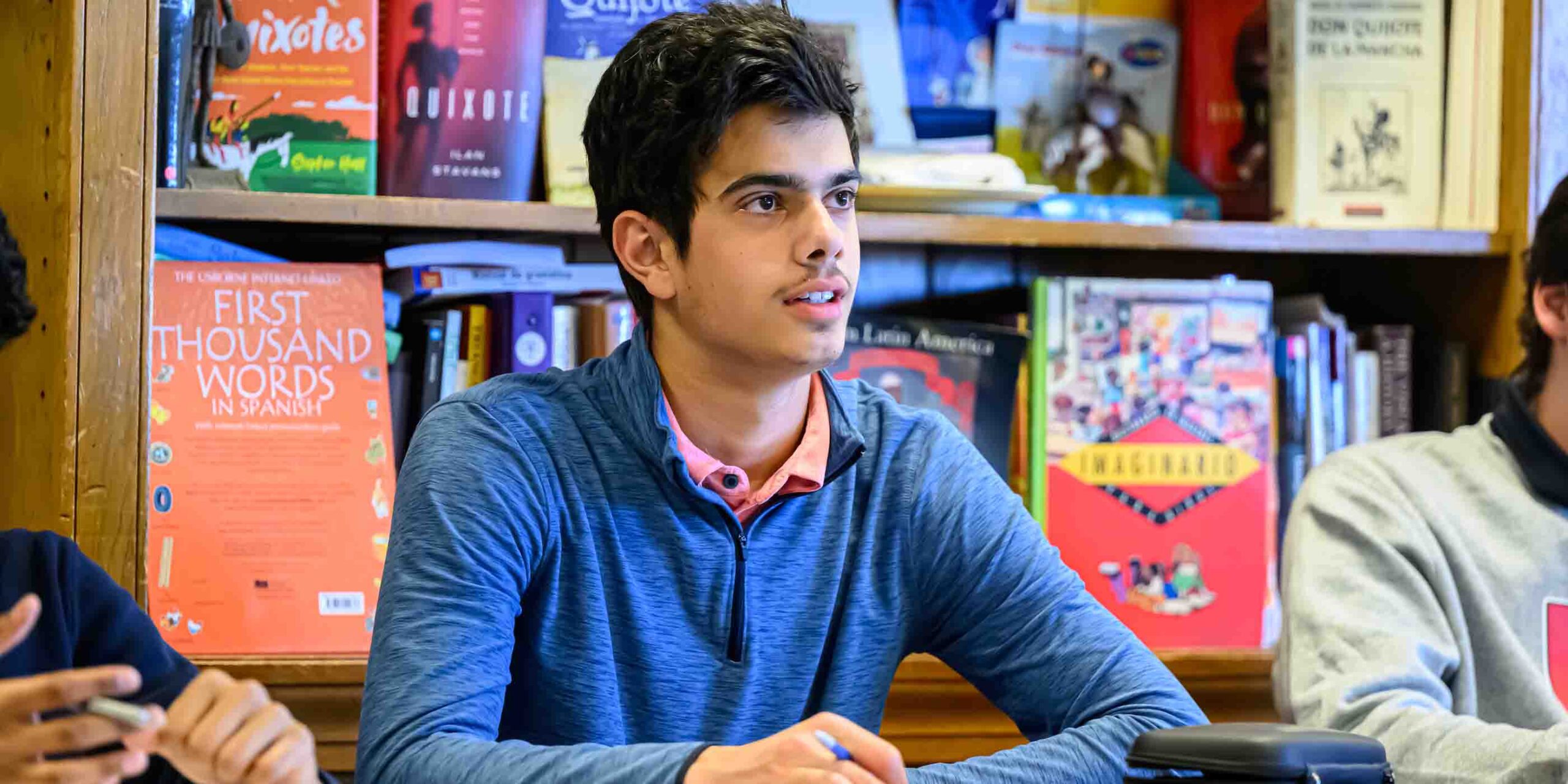现代语言
在罗克斯伯里拉丁语学校,我们相信学习一门现代外语为了解不同的文化--不同的生活方式和感知世界--打开了一扇最广阔的窗口。 了解不同的文化--不同的生活方式和对世界的认知。它使学生能够超越他们的母语成见,掌握表达自己的新方法。它还能让他们站在他人的立场上,这就需要欣赏他们复杂的社会和历史视角、他们的价值观、他们的困境、他们的梦想,以及他们对人类文明的独特贡献。因此,学习外语有助于形成更有同情心、更有责任感、更有批判性和更成熟的全球公民。
为此,我们设计了法语和西班牙语的入门、中级和高级课程,这些课程有三个目的:培养学生的口语、听力、阅读和写作能力;让他们探索各种表达方式(描述、叙述、解释、假设、分析、解释、批评和说服);以及让他们沉浸于法语和西班牙语世界的历史、社会和文化。所有课程都以目标语言进行。在学生第三和第四年的学习期间,可以选择在西班牙加的斯和法国卡昂进行为期一个月的沉浸式学习,这是对两种语言强化学习的重要补充,但也是强烈鼓励的。
法语课程
-
法语 1
French 1 initiates the student into speaking and understanding the language. From simple and convenient structures and expressions, the student is introduced to more complex and sophisticated words and phrases. He learns to use the present tense, the imperative, the future, the “passé récent,” and the simple past, as well as a number of common irregular verbs. His vocabulary is increased weekly until he is able to express many of the common daily experiences of his life in French. We strive to make the vocabulary and structural lessons as immediate and “relevant” as possible. To that end we use the audio-visual program D’Accord from Vista Higher Learning. This program gives the student the advantages of an immersion method by presenting native speakers in vivid situations, in real settings. At the same time, this course is structured so that the student can learn fundamental linguistic principles efficiently. We also use Premier Livre (an introductory grammar book published by Amsco) to supplement students’ understanding of grammar and syntax.
-
法语 2
法语2 以与一年级法语相同的方式继续学习,逐步提高语法和句法的复杂性,直到学生掌握从从句到相对代词的所有常用结构和语法用法。他的词汇量也得到扩大,包括典型的法国成语和表达方式以及法国日常使用的常见词汇。学生将继续进入法国的文化和社会生活,并有机会用语言表达自己。除了惯常的 "对话"--用法语对某一情况进行口头表演外,学生还被要求背诵法语诗歌和歌曲,并在一年中的几个时间点上进行口头报告。他的口头和书面作业都会被打分。我们继续使用 协议》(D'Accord并用一本语法复习书来补充这些材料。 第二本书 (Amsco)。在这一年里,我们阅读了一些故事,这些故事来自 小尼古拉的冒险》(Les Aventures du Petit Nicolas 在春季,我们阅读了精彩的小说。 小王子》(Le Petit Prince.
-
法语 3
法语3完成了 学生对语法、句法和词汇的学习,达到了中级水平,并以更复杂的形式和表达方式来挑战他。学习的主题包括法国历史、地理、文学。 法语国家法国艺术,以及当今的法国。这些都是在诺曼底沉浸式体验之前的有用的预测性主题。词汇积累的重点是扩大学生的能力,通过强调抽象的术语、感觉和想法来更充分地表达自己。读物在激发兴趣的同时扩大并加强了结构和意义。我们选择的读物符合学生的语法和结构需要,也符合他的自然好奇心。我们传统上阅读知名法国作家的短篇作品和诗歌,包括伏尔泰、萨特和莫泊桑。学生们的口头作业和书面作业仍然要打分。特别强调论文写作,以培养学生用法语清楚地表达自己的能力;要求学生写短文和作文,并经常进行口头报告。 为所有的人提供一个机会 语法的主要参考书目。实力较强的学生被敦促在6月参加法语SAT II考试。
-
Honors French 4 (Language and Culture)
Open to boys in Classes II and I, Honors French 4 (Language and Culture) works to strengthen and expand the student’s ability to understand and communicate in the French language. Emphasis is placed on listening, speaking, reading, and writing at an advanced level. All classes are conducted in French. We focus on literary, cultural, and social aspects of French life and thought, and le monde francophone. The course addresses themes such as cinema, literary perspectives, women and men, modern politics, and social attitudes. Readings include works by Voltaire, Sartre, Ionesco, and Laye. The student necessarily deepens his understanding of the people as he learns the language; he is also forced to question his own notions and preconceptions as he considers the issues raised. Students are graded on both their oral and written work. Cours Supérieur (Amsco) serves as the grammar text.
-
Honors French 5
Open to boys in Class I, Honors French 5 focuses on readings that span the four hundred years of French artistic and cultural ascendancy, ranging from Molière’s L’Ecole des Femmes to Camus’ L’Etranger. Other important writers that we study in this course are Ronsard, La Fontaine, Corneille, Rostand, Baudelaire, Maupassant, and Ndiaye. Classes are conducted in French, and there are frequent opportunities for grammar review and vocabulary building. This is a discussion-based course, so students are expected to express themselves orally and in writing at an advanced level. Although much of the course focuses on the formal investigation of literary trends and themes, students refine their language skills through class discussions, creative projects, oral presentations, and by writing textual analysis and comparative essays.
西班牙语课程
-
西班牙语1
西班牙语1通过各种交流活动,鼓励学生以真实有效的方式使用西班牙语,使学生开始了解、说、读和写西班牙语。为此,我们使用Vista Higher Learning的Descubre课程。通过其引人入胜的文本、练习和视频,该课程很好地将西班牙语语法和词汇的学习与相关的西班牙和西班牙-美国社会和文化主题相结合。随着时间的推移,学生将逐渐接触到更复杂的词汇和句子结构,并被介绍到以下西班牙语国家。西班牙、厄瓜多尔、墨西哥、波多黎各、古巴、秘鲁、危地马拉和智利。到年底,他们已经学会了如何使用现在时、过去时和普通、不规则和变位动词的未完成时,并能够在学校和家庭生活、国外旅行、购物和用餐等方面表达许多常见的日常经验。所有的课堂工作都是用西班牙语进行的。
-
西班牙语2
西班牙语2建立在学生的词汇、语法和句法知识的基础上,直到他们掌握了所有常见的结构和动词时态。我们继续使用Descubre课程,并辅以越来越复杂的诗歌、短剧和短篇叙事。学生们继续了解西班牙和西班牙-美国的文化和社会生活,并被介绍到以下西班牙语国家。哥斯达黎加、阿根廷、巴拿马、哥伦比亚、委内瑞拉、玻利维亚、尼加拉瓜、多米尼加共和国、萨尔瓦多、洪都拉斯、巴拉圭和乌拉圭。到今年年底,他们已经学会了如何使用熟悉的和正式的命令,以及指示性和从动语态的所有时态。他们还能够分享许多关于工作场所、健康、技术、城市生活、艺术和时事等主题的共同经验和看法。课堂活动包括口头报告、辩论和短剧。所有课堂工作都用西班牙语进行。
-
西班牙语3
西班牙语3通过对西班牙历史、社会和文化的探索,加深了学生对语法、句法和词汇的了解。这是在加的斯的沉浸式体验之前的一个有用的预期调查。特别强调获得必要的语言技能,以便用目标语言理解、分析和评论不同形式的文本、视觉和视听表达,如诗歌、叙事小说、戏剧、散文、报纸文章、短片、纪录片、媒体广告、绘画和雕塑。课堂活动包括正式的口头报告、戏剧表演、社会和政治辩论,以及创造性和说明性写作。
-
Honors Spanish 4: Spanish America Through Film
Open to boys in Class II and I, the aim of Honors Spanish 4 is to develop high competence in oral and written expression by exploring the history and culture of Argentina, Bolivia, Chile, Cuba, Mexico, Peru, and Puerto Rico through some of the most influential films produced in the Spanish-speaking world in the last 75 years. In the process, students will acquire an analytical framework to understand the language of cinema, and will learn the linguistic tools to analyze films, to express their views of complex historical events, to write sophisticated argumentative essays, to create professional screenplays, and to produce their own short films. Thematically, the course will focus on different cultural, social, and political conflicts in the region, as well as on issues of ethnic, racial, social, and sexual identity.
-
Honors Spanish 5
Honors Spanish 5, an elective offered to Class I, focuses on readings by some of the greatest Spanish and Latin-American writers, including Cervantes, Sor Juana, Neruda, García Márquez, Rulfo, Borges, and Isabel Allende. We survey the major literary and artistic movements, their association with history, and their importance in the shaping and understanding of modern Spanish and Latin American culture. Students refine their language skills through class discussions, creative projects, oral presentations, and by writing textual analysis and comparative essays.

